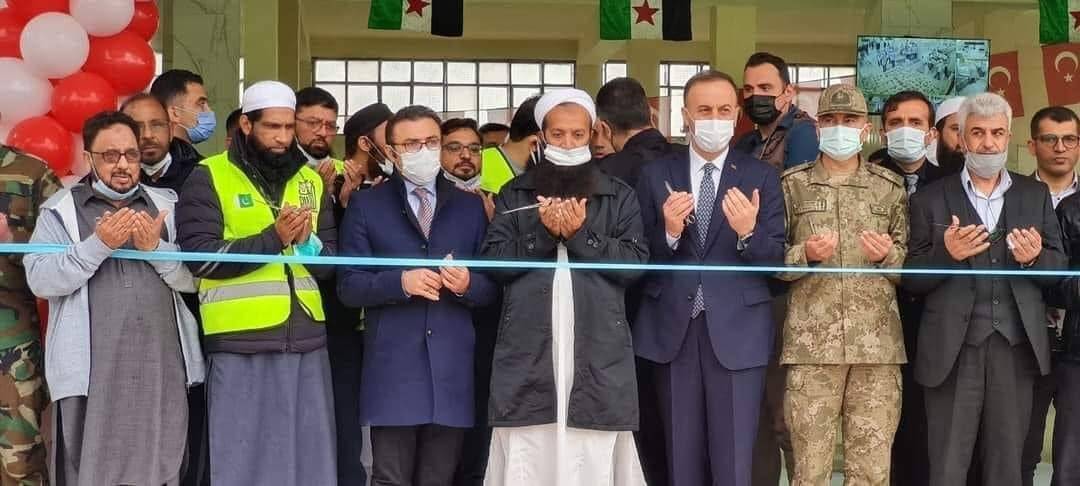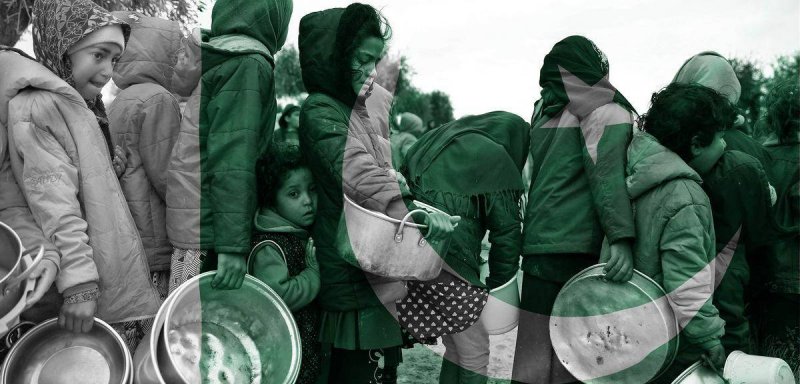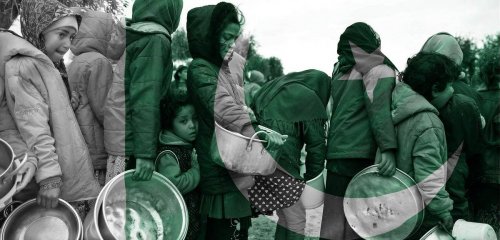With the support of Turkish authorities, Pakistan’s Baitussalam Welfare Trust opened a school in Ras al-Ayn (or Sari Kani in Kurdish) on Tuesday, March 21st. The launch, a school named “Martyr Salem Al-Marai School” and an automatic bakery, took place in the presence of Abdullah Erin – governor of the Turkish province of Şanlıurfa (or Urfa) – members of the local council of Ras al-Ayn and its president Mari Yusuf, representatives of the Turkish Disaster and Emergency Management Presidency (AFAD), and representatives of the Turkish Education Directorate as well as the Turkish Humanitarian Relief Foundation (IHH).
All this took place in the presence of the President of the Pakistani Baitussalam Welfare Trust, Maulana Abdul Sattar. The Turkish governor stated, “The opening of such projects contributes to strengthening brotherhood ties between the peoples of Turkey, Pakistan and Syria.”

The Baitussalam Welfare Trust was founded in the Pakistani city of Karachi in 2010, and it operates in the fields of religious advocacy, education, health, and relief efforts. According to the website of the Union of Non-Governmental Organizations of the Islamic World (the UNIW), which was established in Turkey in 2005, the Baitussalam Welfare Trust “works with AFAD (the Turkish Disaster and Emergency Management Presidency) and the Turkish Diyanet Foundation on assistance programs to help Syrian refugees.”
It is worth noting that Turkish-Pakistani relations have witnessed remarkable developments over the past ten years, with Turkey’s exports to Pakistan during the past year amounting up to more than 400 million US dollars. This also comes in addition to the sale of ATAK attack helicopters along with other equipment that were added to the Pakistani army’s arsenal at a value of one billion dollars, whereas the value of Turkey’s imports from Pakistan during the same period amounted to more than 300 million dollars.
A report published by the ‘Violations Documentation Center in Northern Syria’ states that in addition to the opening of the school and bakery in the city of Ras al-Ayn, the Pakistani Baitussalam Welfare Trust opened nine schools in the city of Azaz, north of Aleppo. The Pakistani Muslim Hands charity organization also erected a school in the city Jarablus, located on the Kurdish-Turkish border.
Humanitarian Action or “Turkeyfication”?
Turkey has had direct control over areas in northern Syria since the beginning of its direct military intervention in Syria in 2016 to fight the Kurds, alongside its support for Syrian armed groups that directly follow the decisions of the Turkish government. The control of the city of Ras al-Ayn, west of al-Hasakah Governorate, began in 2019 following the withdrawal of the Syrian Democratic Forces (SDF) – of which the Kurds make up the primary strength of these forces – from the city under an American agreement.
According to the report by the ‘Violations Documentation Center in Northern Syria’, Turkey has resorted to Islamic countries such as Qatar, Pakistan and Kuwait under the pretext of helping refugees. However, Turkey, “through the funds of these countries, seeks to ‘Turkify’ the Syrian areas it has been occupying since 2016. That is, according to the report, “to turn them into Turkish regions, taking advantage of the poverty and needs of the residents, and continuing its efforts to open schools of a religious and extremist nature”.
The report states that the total number of religious schools that have been opened by Turkey in the areas under its control in northern Syria has reached 220 schools, 120 of which are in the city of Afrin alone – the city from which the Kurdish population was displaced and Arab families settled there instead – as well as 20 schools in the city of Ras al-Ayn, in addition to dozens of NGOs, institutes, and universities.
Also active in the areas controlled by Turkey and the militias affiliated with it are Syrian civil organizations and international organizations that use the cities of southern Turkey, especially Gaziantep, as their headquarters to exercise their activities. However, the restrictions practiced on these organizations continued to increase year after year, until their activities in northern Syria almost disappeared compared to previous years.
The total number of religious schools opened by Turkey in the areas under its control in northern Syria reached 220. Of these, 120 schools are in Afrin alone – from which the Kurdish population was displaced, and Arab families settled there
In a related context, last September, Kurdish journalist Muhyedin Isso published the transcript of a phone call between him and the official in charge of the local council in the city of Ras al-Ayn, Issa al-Bunni. The phone call revealed the official confirming the seizure of a large number of civilian homes in the city. Isso had accused the local council, and behind him the Turkish IHH Humanitarian Relief Foundation as well as the Turkish government, of seizing two houses for his family and turning them into an institute for the memorization of Quranic verses.
Many parties accuse Turkey of trying to “Turkify” its areas of control in northern Syria, from raising the Turkish flag in all the official headquarters and institutions to officially adopting the Turkish language in schools and adopting the Turkish lira in the daily transactions within those areas.
In Kurdish Regions
The Autonomous Administration regions of northeastern Syria (also known as Rojava) – in which the Kurdish Democratic Union Party (PYD) controls most of its joints/parts – enjoy relative stability, as many institutions were built and work has been organized much more institutionally than the areas under Turkey’s control and the militias affiliated with it. This has contributed to the existence of laws that regulate the work of civil associations and the civil society in them.
In recent years, more than one hundred non-governmental organizations have been established in the Autonomous Administration regions. These work in the legal, educational, and environmental fields, as well as in feminist aid and human relief. For example, “Rojava” is the largest relief organization in the region and has been operating since 2012, alongside the Kurdish Red Crescent among others. As a result, the Autonomous Administration established an office for humanitarian organization affairs in 2015 in order to control and supervise organizations, and this office also has the right to interfere in the work of any organization if a need to do so arises.
The Democratic Union Party (PYD) also established “agricultural and women's cooperatives” and organized their work so that these cooperatives would be the acting hand of self-management institutions when it comes to organizing work in the countryside.
Many international organizations, associations, and institutions also operate in these areas. They coordinate their programs directly with the Autonomous Administration or with local partners (organizations and associations). Also operating in these areas are organizations licensed by the Assad regime and the Syrian government. They include associations such as the “Syrian Arab Red Crescent”, “Al-Ber & Al-Ihsan Charity Society” and the “Pan Armenian Charity”.
In addition, many non-governmental civil initiatives that aren't incorporated under the umbrella of associations or institutions can be noted. Some of these include the ‘Greentress’ initiative, which aims to plant trees in the region, and the ‘Residents of the Hilaliyah Neighborhood’ group, in which individuals plant trees as well as collect money and humanitarian aid to help those poor and needy in the city of Qamishli.
In Regime-controlled Areas / In Areas Under Regime Control
Research and estimates indicate that more than 91% of the organizations operating in Syria, within all Syrian regions, were established after 2011 – the year the Syrian revolution began – due to the urgent need for these associations as a direct result of the absence of government institutions and their inability to provide the necessary needs, noting that the number of organizations operating in Syria before March 2011 had reached 1074, according to statistics and reports issued by the Ministry of Social Affairs and Labour.
While a Syrian minister accused international organizations of corruption and lack of impartiality, media reports indicated that United Nations organizations contributed to the survival of the Assad regime and its strengthening
After Bashar al-Assad assumed authority in Syria, following the death of his father Hafez al-Assad in 2000, and his marriage to Asma al-Akhras – who later came to be known as Asma al-Assad - civil society became significantly active in Syria. Dozens of organizations and associations that dealt with various fields and aspects were established under the auspices/patronage of Asma al-Assad. The most prominent of these organizations was the Syria Trust for Development, which was established in 2001 under her command.
The Syrian President’s wife indirectly controlled most civil groups and community associations in Syria, either through the Syrian Trust for Development or through her personal office.
Also active in regime-controlled areas are international organizations, especially those under the umbrella of the United Nations, most notably the World Food Program (WFP) and the World Health Organization (WHO). While the Minister of Social Affairs and Labour accused international organizations operating in Syria of corruption and a lack of impartiality, many news and media reports – most notably a news report published by the Guardian – have indicated in previous years that the United Nations has contributed to the survival and strengthening of the Assad regime by injecting financial assistance and aid that reaches Damascus through its own organizations operating in Syria.
In this context, it is noteworthy to mention that 73 non-governmental relief organizations suspended their cooperation in information-sharing with the United Nations within Syria in 2016, in protest of the Syrian government’s tangible and significant influence on the performance of UN agencies operating in Syria.
Raseef22 is a not for profit entity. Our focus is on quality journalism. Every contribution to the NasRaseef membership goes directly towards journalism production. We stand independent, not accepting corporate sponsorships, sponsored content or political funding.
Support our mission to keep Raseef22 available to all readers by clicking here!
Interested in writing with us? Check our pitch process here!




